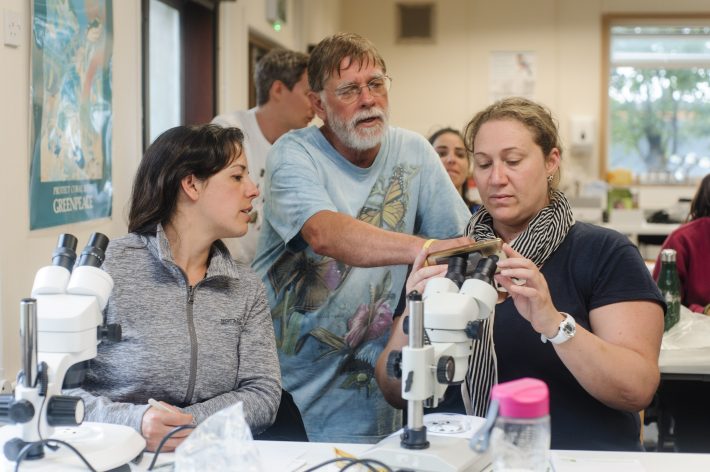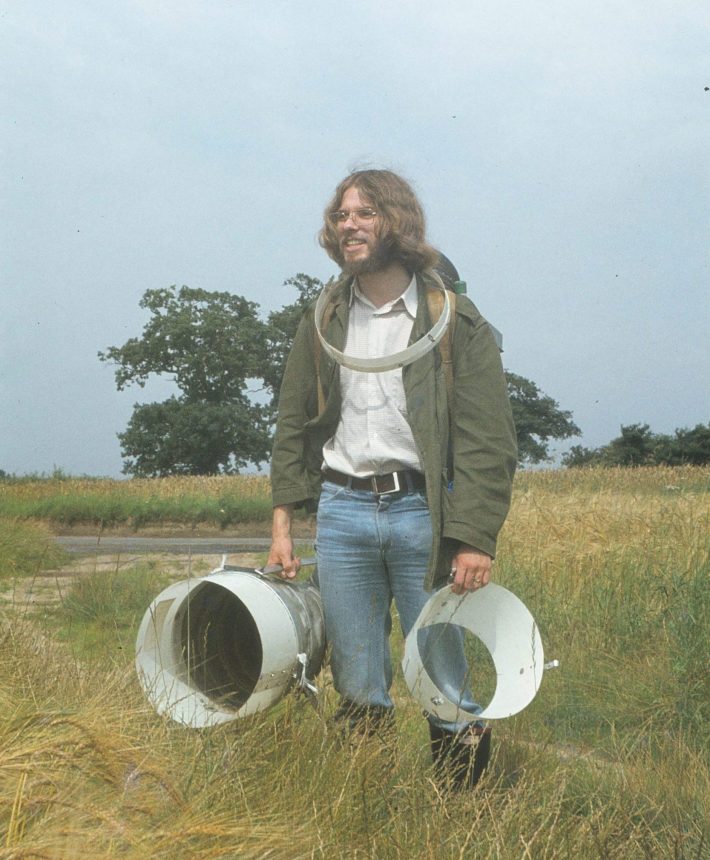Obituary: Simon Leather
For Professor Simon Leather, leading ecologist and entomologist and passionate educator, remembered by former student and outreach collaborator Chris Jeffs and friend and colleague Allan Watt.

Simon’s long and diverse publication record is testament to his standing in ecology and entomology, and he was admired by all for his dedication to the teaching and communication of entomology.
Simon made significant contributions to the literature on insect ecology, agricultural entomology, forest entomology and insect conservation, publishing and editing journals in each of these areas including as Associate Editor of BES Journal of Animal Ecology.
He was well-known for working on insect pests, particularly pine beauty moth, and he held a position within the UK Government Tree Health and Plant Biosecurity Taskforce. Simon cited one of his proudest achievements as developing an early aphid forecasting system during his time working in a postdoctoral position in Finland. This system is still used in pest control today. He subsequently spent almost a decade working on pine beauty moth for the Forestry Commission, testing various hypotheses about the emergence and regulation of its outbreaks.
It seemed that Simon knew almost every single entomologist and insect ecologist around.
Simon also made important contributions on insect decline and threats to the environment, including a thought-provoking piece on shifting baselines in knowledge. Indeed, thought-provoking was often the aim of Simon’s writing, such as his charge that institutional vertebratism was holding back insect conservation. These messages were not always welcome but they needed to be said and he was not afraid to say them. Many will remember spirited jousts with Simon over the proportional representation of entomology within conference programmes, articles, and even their prominence as journal cover images. It certainly kept editors and conveners on their toes.
Importantly, many will remember Simon as a friend and a great person to spend an enjoyable evening with in the bar over a glass of red wine.
An advocate for Entomology
To Simon, creating the next generation of entomologists and insect ecologists was not just a passion, but a mission.
Simon’s love of the natural world was apparent from an early age, particularly inspired by his early years growing up in Jamaica as well as in his beloved Yorkshire. Simon’s first degree was a BSc in Agricultural Zoology from the University of Leeds, followed by his PhD at the University of East Anglia, where his love of insects blossomed, and in particular his love of aphids and their varied lifecycles.
Simon was a leader in the call for increased specialist training in entomology and taxonomy, and was impassioned to ensure that entomology degrees be offered in the UK. He spent two decades with Imperial College London from the 1990s, leading the Entomology, Integrated Pest Management and Applied Ecology taught courses, including the applied suite of Masters at Silwood Park Campus. This was followed by a successful transition of these courses to Harper Adams University in 2012 to ensure their continuation, which led to establishing the (at one point the only) BSc Zoology with Entomology offered in the UK.
It seemed that Simon knew almost every single entomologist and insect ecologist around. You would often hear his familiar comment of “they were one of my students” at any conference or event. The fact this could be anyone aged 18-40+ demonstrated his decades of teaching and mentorship in the field.
A friend and dedicated communicator
For many, Simon’s greatest contribution was to pass on an enthusiasm for all things entomological. He was interested in anything to do with insects, and keen to share his knowledge. There was no better champion of the ‘little things that run the world’.
He took every opportunity to promote insect science and when less traditional media became available he quickly took to blogging and social media, soon becoming social media’s voice of entomology as ‘EntoProf’ on Twitter where he was known not only for his science communication but also for sharing his weekend walks and roast dinner plans. His work on urban ecology also included most notably research on the biodiversity and function of roundabouts, which inspired the title of his blog ‘Don’t Forget the Roundabouts’. Simon inspired cohorts of students to take up Twitter for science communication, and try their hand at writing engaging content.
Simon’s legacy will be widespread and lasting, especially through the hundreds of aspiring ecologists and entomologists he enthused.
Simon was a regular coordinator of and contributor to careers conferences and Entomology days at BES Summer Schools for post-16 and undergraduate students. We will remember him armed with trusty pooter, sweep net, and the petrol-powered giant suction sampler that always got the students enthused, his flamboyant array of entomological T-shirts, and the familiar lanyard around neck with trusty eye-lens attached for insect identification on the go. It was a common sight to see Simon roaming the fields of our residential Summer School locations at dusk, setting up pitfall traps for the following day.
Legacy
Simon kept on working and writing, even from hospital beds and until the day he died. His final book, coming out in 2022, is Insects: a very short introduction, and will be a fitting celebration of Simon’s life. In his final blog post, shared only days before he passed away, he articulates his life’s passion and his hopes for the book “I just hope that when it hits the shops, my readers will find as much to enjoy as I have since I first came across insects just over sixty years ago.”.
Simon’s legacy to ecology and entomology will be widespread and lasting, through his publications, but especially through the hundreds of aspiring ecologists and entomologists he enthused.
He was and is an inspiration, as many people from early to late-career have said, and he is both a huge loss to insect science and an enormous personal loss to so many.

Like what we stand for?
Support our mission and help develop the next generation of ecologists by donating to the British Ecological Society.